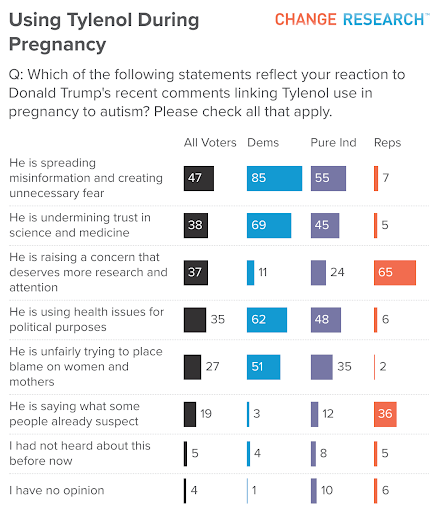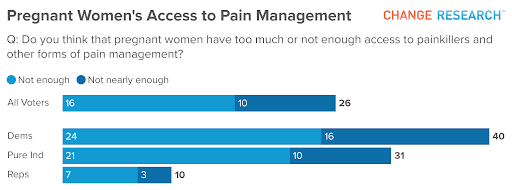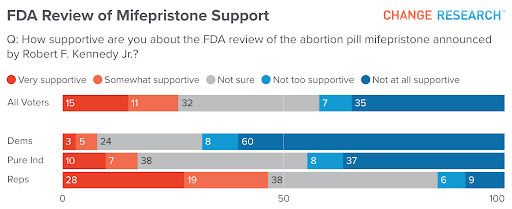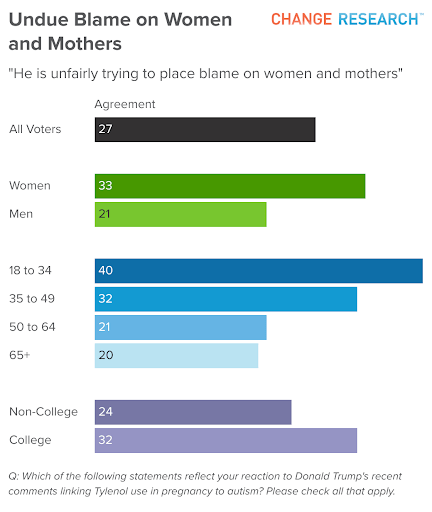New polling shows deep partisan divides on medical misinformation and trust in science
A new nationwide survey by Change Research reveals deep partisan divides in how Americans view President Donald Trump and Health Secretary Robert F. Kennedy Jr.’s comments asserting that there is a link between acetaminophen (Tylenol) use during pregnancy and autism. The poll, conducted September 28-October 6, 2025, interviewed 1,596 registered voters as part of Change Research’s internal Compass Poll series, which informs the Change Research Data Portal.
Misinformation or a Valid Concern? Public Opinion Splinters
Following Trump’s September comments about a possible link between Tylenol and autism, 47% of registered voters indicate he is spreading misinformation and creating unnecessary fear. And 38% say he is undermining trust in science and medicine.
At the same time, 37% indicate Trump is raising a concern that deserves more research and attention, while 35% believe he is using health issues for political purposes. About one in five voters (19%) say he is saying what some people already suspect.

The divide falls sharply along party lines: 85% of Democrats indicate Trump is spreading misinformation, compared with just 7% of Republicans. Among voters who identify as MAGA Republicans, 73% say his comments raise concerns worth further study.
Partisanship drives most of these views, though some differences emerge within parties. Younger Democrats (65%) and college-educated Democrats (70%) are most likely to say Trump is spreading misinformation, compared with just over half of older or non-college Democrats (about 55%). Among Republicans, opinions are largely consistent across age, gender, and education.
Uncertainty Over Pain Relief in Pregnancy
When asked whether pregnant women have enough access to pain management options*, 29% say access is “about right.” Another 25% say there is “not enough” or “not nearly enough,” while 12% say there is “too much” or “far too much.” A third of voters (33%) say they are unsure.

Democrats are more likely than Republicans to say pregnant women lack sufficient access (40% vs. 10%), a gap of 30 points.
Sharp Divides on Mifepristone Review
Following Kennedy’s announcement of an FDA review of the abortion medication mifepristone, 26% of voters say they support the review, while 42% oppose it and 32% are unsure.
Support is highest among Republicans (47%), including 53% of MAGA Republicans. Only 8% of Democrats support the review, while 68% oppose it.

Voters See Blame, Bias, and Confusion
More than one-quarter of voters (27%) indicate Trump is unfairly blaming women and mothers. That view is more common among Democrats (51%), women (33%), and college-educated voters (33%).

About 19% say Trump is “saying what some people already suspect.” Five percent of respondents had not heard about Trump’s comments before the survey.
According to the CDC, one in 31 eight-year-olds are identified with autism spectrum disorder, up from previous years; an increase researchers attribute primarily to expanded screening, awareness, and diagnostic criteria.
The findings reflect how medical and scientific debates have become political fault lines, with partisan identity shaping public opinion even on routine health guidance.
About This Poll
Change Research conducted this survey among 1,596 registered voters from September 28 to October 6, 2025. The modeled margin of error is 2.6%. The poll includes responses across party identification, gender, age, ethnicity, and education levels.
